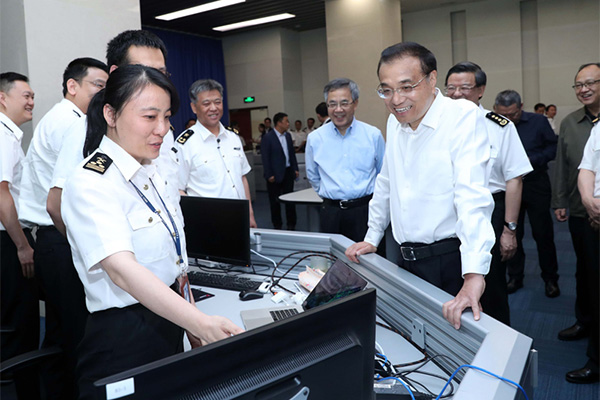
Premier Li Keqiang makes an inspection tour to the General Administration of Customs in Beijing, capital of China, May 21, 2018.
At the State Council executive meeting chaired by Premier Li Keqiang on Sept 18, measures were decided to promote foreign trade growth and customs clearance convenience. Eight days later, the same topic was mentioned again at the regular executive meeting on Sept 26.
Measures to streamline customs clearance procedures at a faster pace, and promote a higher level of opening-up were decided at the meeting chaired by Premier Li.
He said a more proactive opening-up strategy would be implemented to create an investment environment for foreign trade businesses that is fairer, more convenient and predictable.
The Premier said China is the largest country in commodity import and export trade, and foreign trade is important to domestic industrial upgrading and people’s consumption. However, the current higher trade costs and non-transparent charges have greatly affected China’s foreign trade development, so more efforts should be made to increase the import and export efficiency while lowering the costs, he added.
The meeting on Sept 26 decided that by Nov 1 this year, the number of customs clearance documents subject to verification at ports will be reduced from 86 to 48. The list of administrative charges at ports will be released before the end of October, and no extra fees will be charged.
Premier Li stressed the overhaul of fees must be completed without delay to abolish unreasonable charges and cut compliance costs, and urged the compliance costs for containers clearing will be reduced by at least $100 by the end of this year.
He demanded related departments cooperate and supervise the policy implementation, and truly reduce costs for foreign trade companies on the premise of following market rules.
At the meeting, it also was decided to reduce import tariffs on 1,585 taxable items starting Nov 1. The move adds to a slew of tariff cuts China introduced this year and will save an estimated total of 60 billion yuan (about $8.7 billion) for firms and consumer. It also will put the country’s overall tariff rate at 7.5 percent, down from 9.8 percent in 2017.
Premier Li said policies should be fulfilled exactly to benefit the people, and the move serves industrial upgrading, lowers corporate costs, reduces the price of domestic consumer goods and meets domestic demands at the same time.
